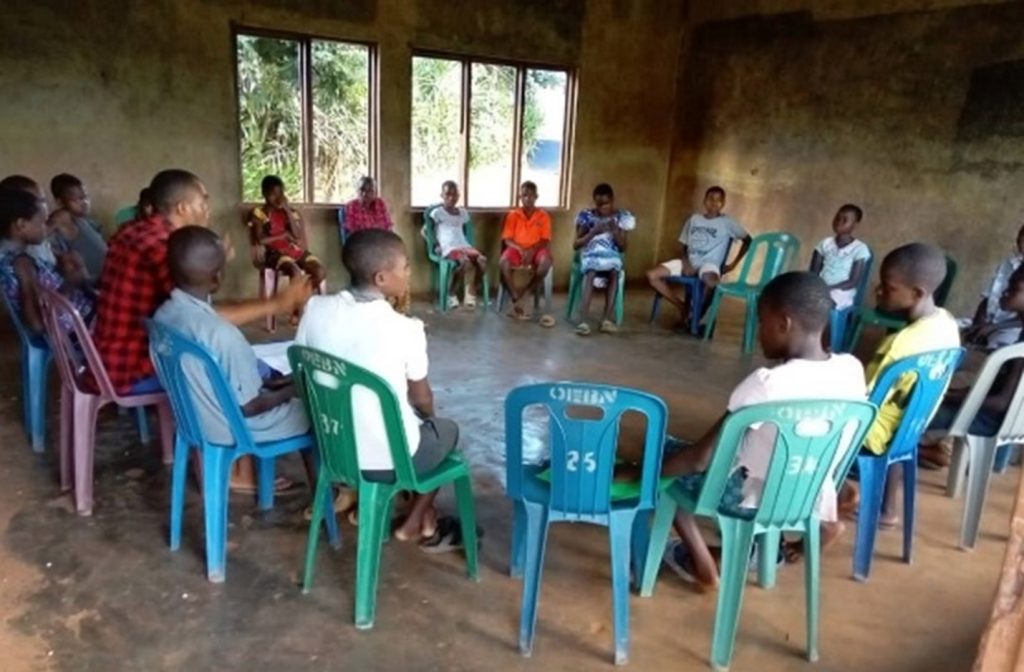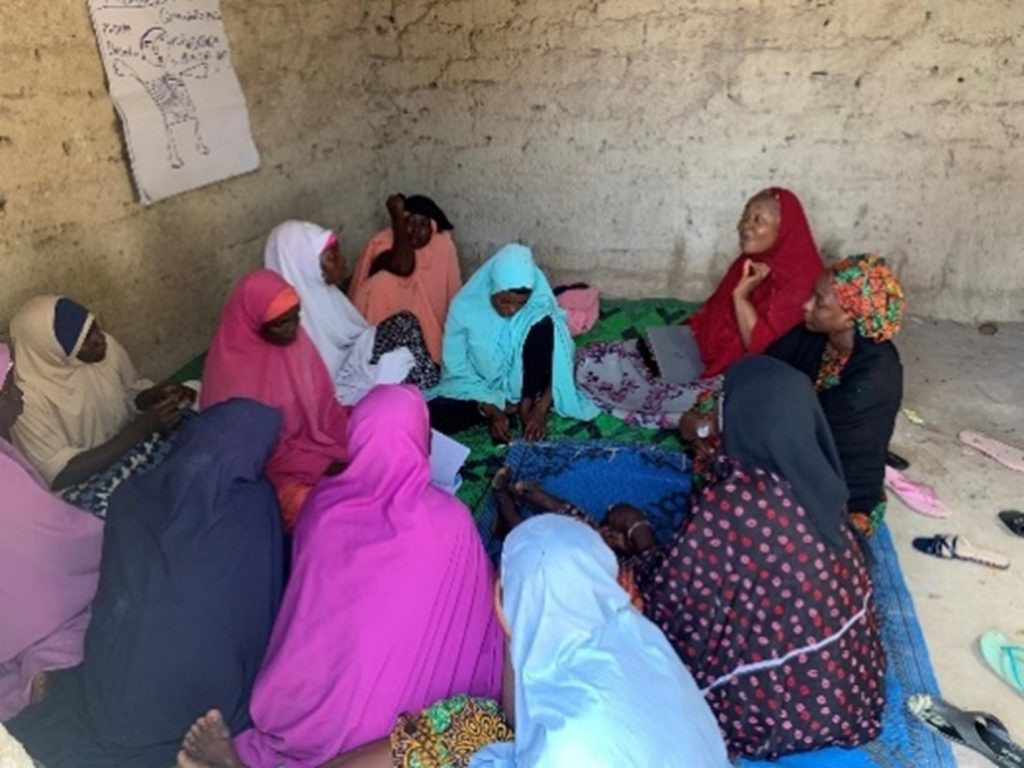Community Organizations Transform Gender Norms in Nigeria
Published on November 15, 2023
By Katherine Wise, Jhpiego Communications Consultant and Chioma Oduenyi, Project Director, MOMENTUM Country and Global Leadership GBV activity. With contributions from the Helping Hands Grassroots Support Foundation (HHGSF), the Excellence Community Education Welfare Scheme (ECEWS), and Rural Women AND Youth Development (RUWOYD).
Photos by Cyprian Nnamdi, Ukpa for Excellence Community Education Welfare Scheme (ECEWS)

Gender-based violence (GBV) is a common social problem in Nigeria that disproportionately affects women and girls: recent estimates show that almost one in three women ages 15-49 in the country have experienced physical violence. Root causes include Nigeria’s deeply patriarchal society and harmful social norms—such as the belief that girls should marry early to protect their chastity, and that fertility decisions should be determined by men—as well as structural inequality that places women subordinate to men.
Partnering with trusted and knowledgeable community organizations, MOMENTUM Country and Global Leadership is working to give communities frameworks and tools to shift harmful norms and prevent and address violence against women and girls in two states: Ebonyi and Sokoto.
To spark this fundamental change in long-held behaviors, MOMENTUM strengthens and supports local partners to implement evidence-based, gender-transformative programs in their communities. To do this, MOMENTUM provided training and ongoing mentorship to help partners grow their organizations in self-determined areas of need including gender policies, risk mitigation, and strategic planning. MOMENTUM also supported partners to adapt an evidence-based community mobilization intervention called Choices, Voices, Promises, originally developed by Save the Children, to transform gender norms and promote gender equity. The Choices program challenges girls’ and boys’ views on restrictive gender norms; the Voices program increases dialogue between parents and children; and the Promises program creates environments within communities where girls and boys are valued equally.
The end goal of all this support? Strong local organizations able to deliver quality GBV prevention and response into the future.
With MOMENTUM’s intervention, partners take a holistic approach to countering GBV that actively engages key groups such as young adolescents, women, parents and families, community leaders, health care providers, and government officials. This includes working with boys and girls to transform gender norms and prevent child, early, and forced marriage; advocate for keeping girls in school; and mitigate gender-based violence. Four individuals involved in the program: Alhaji Muhammed, Nwali, Yakubu Isah, and describe how this work is reaching them and their communities.
Alhaji Muhammed, District Head of Salame community in Sokoto State
“Child, early, and forced marriage will be a thing of the past in the Salame community,” says Alhaji Muhammed, District Head of Salame community, a semi-urban town in Sokoto State.
He leads the GBV Multi-Sectoral Taskforce in his community to help end early and forced marriage and prevent the harmful effects of early marriage on girls.
The taskforce recently intervened in the case of Aisha Soro (name changed), a 15 year old who fled home when she learned about her parents’ plans for her to marry a 55-year-old man. The taskforce located Aisha and her parents and facilitated a reconciliation meeting with her family, the prospective husband and his family, and district heads in the community.
The taskforce shared the dangers of child, early, and forced marriage, including the risk of rape, physical and emotional abuse, hard labor, economic hardship, disease, and death. At the end of the meeting, the two families and community leaders agreed with Aisha’s wishes to delay marriage and continue her schooling.
Nwali, 12-year-old, Ebonyi State
“In my community, it’s very common for parents to send out their daughters into marriage,” says Nwali, a 12-year-old in Ebonyi State, Nigeria.

She recently participated in a session using the Choices, Voices, Promises curriculum where community based-facilitators offer very young adolescents ages 10-14 a participatory space to learn about and discuss gender norms and life skills with their peers. The program uses a curriculum of age and developmentally-appropriate activities designed to stimulate discussion and reflection. These include making drawings, engaging boys and girls in performing household chores together, and offering a range of role playing activities. The program also promotes adolescent health, well-being, development, and dignity so participants can realize their full potential.
“Through this program…I will ensure I stay in school and complete my education. I will also make sure not to send my daughter out for marriage early. It is good to send girls to school so they can have a good education,” says Nwali.
Yakubu Isah, Village Head, Kalmalo Community in Sokoto State
In the Kalmalo Community in Illela, Sokoto State, boys traditionally assist on the family farm while girls do house chores. While farm activities are seasonal and done early in the morning, house chores are an everyday logistical maintenance of the home, taking up a great amount of time.
Using the adapted Choices, Voices, Promises curriculum, community-based facilitators and implementing partners supported by MOMENTUM led a series of 10 small group participatory sessions for very young adolescents that challenged harmful gender norms and behaviors of adolescent girls and boys and can ultimately transform the way girls and women are perceived and treated.

The sessions provide space for adolescent girls and boys to learn about and challenge harmful gender norms such as exclusively assigning housekeeping chores to girls and prohibiting boys from assisting in the home.
Yakubu Isah, the Village Head in Kalmalo Community, appreciated MOMENTUM’s intervention and said that “my son, who was part of the session, has greatly surprised me with the way he now supports his sisters with house chores.”
Chief Ugbo Augustine, whose son also participated in a session, said “When both boys and girls are involved in the household, there is always happiness, joy, and cooperation in the family.”
To date 840 adolescents, 957 parents, and 991 community members have completed the Choices, Voices, Promises programs in Sokoto and Ebonyi. The program will continue until September 2024.
Ebonyi State: Essential Health Network for Rural Dwellers (EHNRD); Daughters of Virtue and Empowerment Initiative (DOVENET); Excellence Community Education Welfare Scheme Ltd (ECEWS)
Sokoto State: Nana Girls and Women Empowerment Initiative (NANA); Helping Hands and Grassroots Foundation (HHGF); and Rural Women and Youth Development (RUWOYD)

